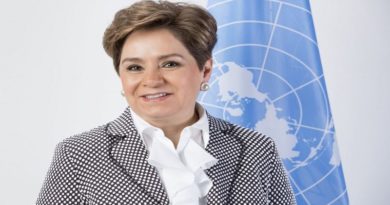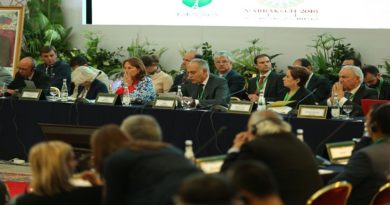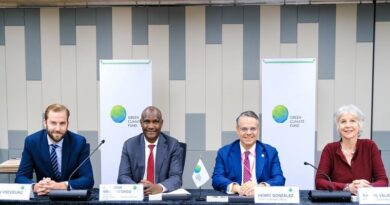COP Troika high-level event disappoints in New York as presidencies show up empty-handed on climate commitments
The 350.org on Thursday 26 September 2024 expressed concerns over the lack of concrete commitments of the Troika presidencies, in particular, to transition away from fossil fuels and triple renewable energy at the ongoing Climate Week NY, the COP Troika, – the United Arab Emirates (COP28), Azerbaijan (COP29), and Brazil (COP30) – hosted the high level-event “Roadmap to Mission 1.5: Driving the next generation of climate action and ambition”.
While presidents stressed the need for 1.5-aligned Nationally Determined Contributions (NDCs), sector-specific climate goals and transitioning away from fossil fuels, the Troika presidencies failed their own test to present any new and concrete commitments at their own event. COP28 President Sultan Al Jaber announced that the UAE would present its NDC ahead of COP29, but did not outline what it would entail.
The Troika’s mission is to keep alive the goal of limiting global warming, but they are set to increase their combined oil and gas production by 33 percent by 2035. The expansion of oil and gas investments work against the COP28 agreement to transition away from fossil fuels, triple renewable energy capacity and double the rate of energy efficiency. New analysis by Climate Action Tracker also finds Azerbaijan’s climate action “critically insufficient”.
The next two months serve as a critical litmus test for climate ambition ahead of the UN climate conference in Azerbaijan, COP29, this November. The COP Troika, the UAE, Azerbaijan and Brazil must lead by example. To start, they must present NDCs that explicitly lay out how they will phase out fossil fuels and expand renewable energy projects fairly, in line with what they agreed at COP28.
Namrata Chowdhary, 350.org Leader says:”While this is not entirely unexpected, today’s event led by these petrostates has once again revealed their continuing willingness to put greed before the planet’s needs. How will they transition away from fossil fuels in line with the outcome of the Global Stocktake and improve their targets? Without concrete commitments to halt fossil fuel expansion, it was an unforgivable exercise in mere rhetoric.
The decisions made now are some of the most important policy changes in the next decade. They will decide the future of our planet. Given the urgency of the climate crisis, this reluctance to put aside profits in favor of the common good is simply unforgivable. Unless Azerbaijan and the UAE commit to more bold climate action they will continue to be on the wrong side of history. We must also be vigilant that they do not keep using dangerous offset and funding scams to claim that they are leading on climate action.
The COP Troika must set the tone for other countries: As world leading fossil fuel producers, their NDCs need to lay out clearly how they will transition into a fair renewable energy-led economy.”
Ilan Zugman, 350.org Latin America Managing Director: “If Brazil is serious about a 1.5-aligned NDC, as mentioned in Lula’s speech and in this event by COP30’s president, it must tell us that it will stop fossil fuel projects and lay out a plan to fairly transition towards renewable energy projects that benefit all.
Brazil has a great opportunity to step up. It must lead by example domestically if it wants to truly be a climate leader internationally. Fossil fuels do not amount to development and cannot go hand in hand with the scaling of renewable energy.
Brazil is rightly calling on rich countries to fulfill their obligation to reduce emissions drastically and finance mitigation and adaptation for developing countries. However, all countries have their fair share, and Brazil, as one of the world’s biggest economies and the G20 and COP30 host, has immense potential to phase out fossil fuels and lead by example.”
Makerusa Porotesano, Pacific Climate Warriors Council Elder says, “Every year, we show up to COP and show the world what it stands to lose if we don’t immediately end fossil fuels and choose safe, renewable energy. To speak frankly, the Pacific is tired of simply being a place where the world’s climate anxieties can be visualized and not acted upon.
This COP troika has an immense responsibility, in this critical decade, to push for the implementation of a fossil fuel phase out and an ethical renewable energy build. We are already demanding that Australia, as the potential COP30 president, step up its climate action significantly. The standard that the UAE, Brazil, and Azerbaijan set this week could determine just how high Australia’s “step-up” will be.”




